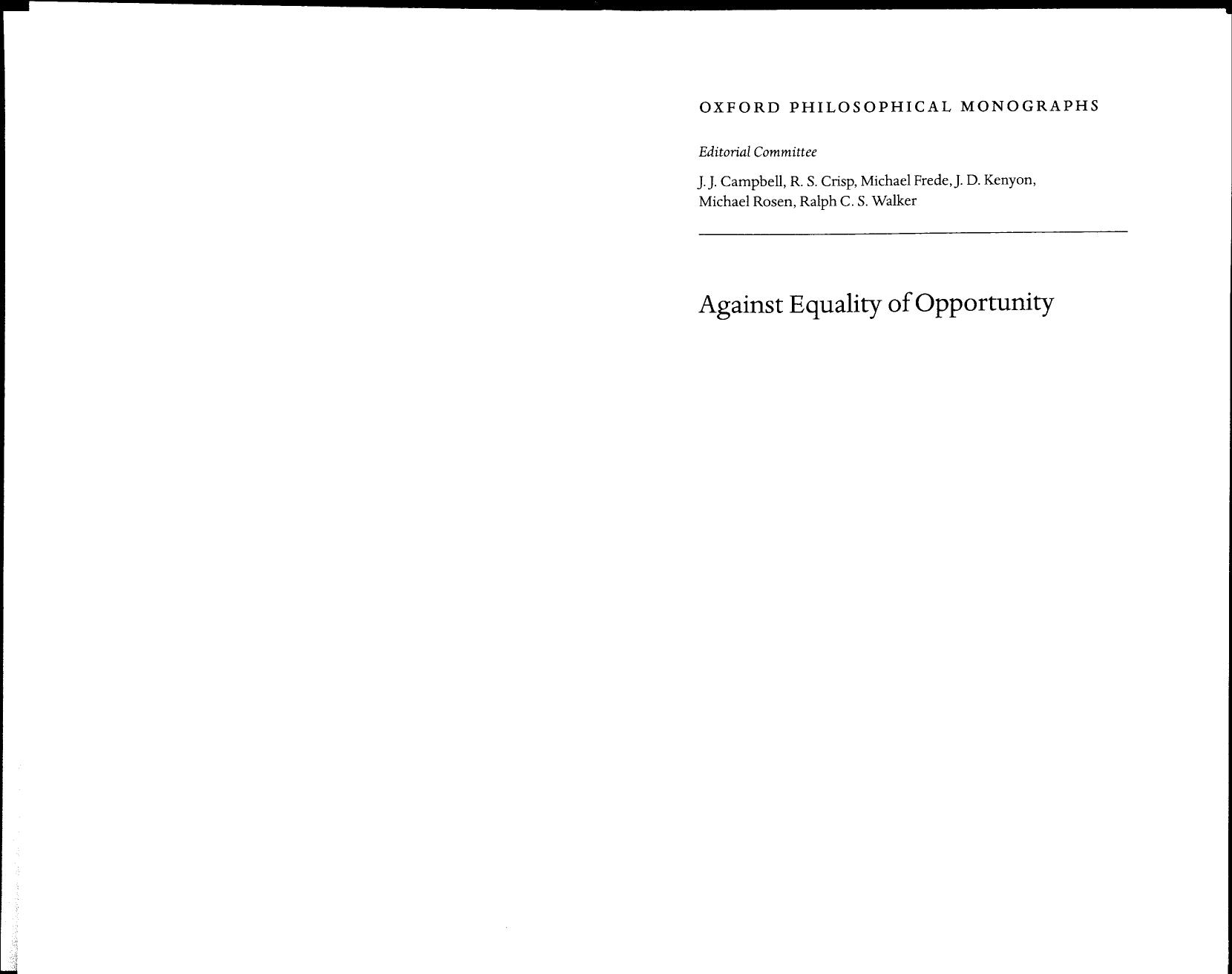Against Equality of Opportunity (Oxford Philosophical Monographs) by Matt Cavanagh

Author:Matt Cavanagh
Language: eng
Format: epub, pdf
4. EGALITARIAN ARGUMENTS THAT APPEAL
NOT TO SOME CLAIM WE ARE EACH
SEPARATELY THOUGHT TO POSSESS, BUT
TO OUR RELATIONS WITH EACH OTHER
There is one more kind of egalitarian argument we have to consider-one which does seem as if it might actually imply that people's claims are truly relative. Instead of appealing to some claim we are each separately supposed to possess, this kind of argument appeals to the idea that our most fundamental equality consists in our relations with each other. Consider the case of a small and closeknit group who have to divide among themselves the spoils of some collective enterprise. They might decide to divide them equally as a way of expressing their fraternity: that is, as a way of expressing that even though they didn't all make the same contribution, they are nevertheless equal in the most important respect, in being equal members of the group. Any other way of dividing the spoils would seem, precisely, divisive, and would not reflect the way they see their relations with each other.
As I said, this kind of argument does seem to imply that claims are truly relative. We saw in the last section that the way to test whether claims are truly relative is to imagine that everyone already has more than they have any claim on in any non-relative sense-and then ask whether, if there is anything left over, this too should be distributed equally. Let us imagine, then, that this small and closeknit group has been collectively overrewarded, such that all of them are bound to get far more than they could be said to have any claim on in any non-relative sense (for example, as compensation for the work they put in). I suspect that if they are a truly fraternal group, they would still think the rewards should be divided equally, however large they might be.
We seem, at last, to have found an argument which is both fundamentally and truly egalitarian. That is, it actually starts from the idea of equality, rather than simply bringing it in at some later stage; and it implies that people's claims are truly relative. The question is whether the argument can be extended from the kind of case I have just described, the case of a small and closeknit group involved in some common enterprise, to a wider context. It certainly can't be applied to sets of individuals who don't form a 'group' in any substantial sense who have no shared history or future and who form a `group' just in the sense that they are the subject of a particular distributive decision. It would be absurd to suggest that such a disparate set of individuals should see their formal membership of this 'group' as more important than their differences. For the same kind of reason, this argument also can't be applied to humanity as a whole. Humanity has never been a collective enterprise in any substantial sense-and is unlikely to become so, unless science fiction becomes reality and we end up battling aliens for our survival.
Download
Against Equality of Opportunity (Oxford Philosophical Monographs) by Matt Cavanagh.pdf
This site does not store any files on its server. We only index and link to content provided by other sites. Please contact the content providers to delete copyright contents if any and email us, we'll remove relevant links or contents immediately.
| General | Discrimination & Racism |
Nudge - Improving Decisions about Health, Wealth, and Happiness by Thaler Sunstein(7706)
The Fire Next Time by James Baldwin(5444)
iGen by Jean M. Twenge(5415)
Adulting by Kelly Williams Brown(4574)
The Sports Rules Book by Human Kinetics(4386)
The Hacking of the American Mind by Robert H. Lustig(4382)
The Ethical Slut by Janet W. Hardy(4251)
Captivate by Vanessa Van Edwards(3839)
Mummy Knew by Lisa James(3691)
In a Sunburned Country by Bill Bryson(3542)
The Worm at the Core by Sheldon Solomon(3487)
Ants Among Elephants by Sujatha Gidla(3467)
The 48 laws of power by Robert Greene & Joost Elffers(3291)
Suicide: A Study in Sociology by Emile Durkheim(3022)
The Slow Fix: Solve Problems, Work Smarter, and Live Better In a World Addicted to Speed by Carl Honore(3009)
The Tipping Point by Malcolm Gladwell(2921)
Humans of New York by Brandon Stanton(2873)
Get What's Yours for Medicare: Maximize Your Coverage, Minimize Your Costs by Philip Moeller(2729)
Handbook of Forensic Sociology and Psychology by Stephen J. Morewitz & Mark L. Goldstein(2705)
